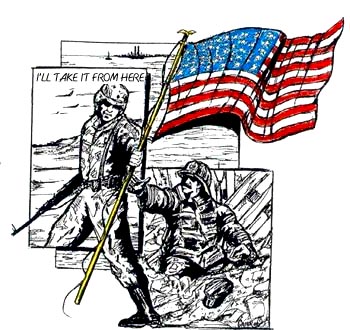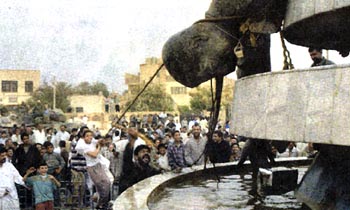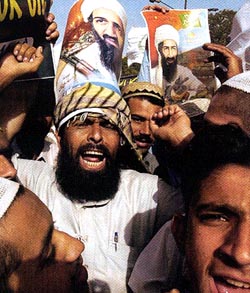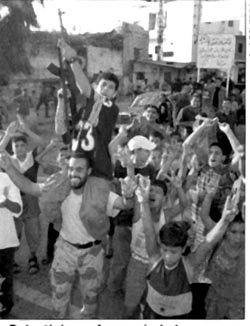 |
War against Terrorism
Yes, It is a Just War
Atila Sinke Guimarães
I was asked to give arguments to prove that this war is just, since I wrote that I support it. Let me dive straight into the topic.
1. Is the war with Iraq an independent war?
The first point that needs to be clarified is what this war with Iraq means. I am hearing talk against the war with Iraq as if it were an independent war. “I was pro-war with Afghanistan. But I am against the war with Iraq.” To separate these two wars as two different issues, in my opinion, is not correct.
 
This sketch drawn by a member of an elite troop fighting on the front clearly shows that the soldiers consider they are punishing the offense made on September 11

Indignant Iraqi citizens in Karbala pull down a 15-foot bronze statue of Saddam Hussein - L.A. Times, April 7, 2003 |
We are witnessing an en masse effort of the United States government and military forces that has already touched two countries and most probably will extend to others. The whole effort needs to be judged as a unit, and not separately. When you open a tangerine to eat, you don’t consider each section as a different fruit. The ensemble of the sections of the tangerine makes up the tangerine, one piece of fruit. Likewise, the war with Iraq is only the second section of the tangerine.
What I am saying is not a theoretical speculation. It is the reality. The American government sees it this way, the majority of the American population implicitly or explicitly sees it this way, the officers and soldiers who are on the front see it this way (see first picture).
I understand that upright men or women can be against the war and consider it a separate issue. I am trying to clarify the picture for them. If not my arguments, it is time that will expose the other sections of the tangerine.
Do the directors of the anti-war movement also honestly think that this war is an independent issue? I doubt it. I think that they realize perfectly what I am saying, but for their interests it is more efficient to claim that it is a different war, since this makes it .an easier target for attack. Further, I doubt that any discussion will change their minds.
Then, the criteria of just war or unjust war have to be applied to this ensemble.
2. Who is behind the terrorism?
The attacks against the Twin Towers and the Pentagon had some specific characteristics that should be considered for an objective evaluation of the present day war. They were made by three teams of young male hijackers of different nationalities, all Muslims, all Arabs, all determined to sacrifice their lives in order to destroy the planes they had boarded as well as their symbolic targets. They aimed to kill as many Americans as they could, and to inflict an enormous moral offense to, and colossal material damage on, the United States. They aimed to shake the American establishment and make it unstable. Their acts were correctly classified as acts of terrorism, of a special and extreme type of terrorism whereby the agent immolates himself when he executes the act.
Who were the ones behind the hijackers, the ones responsible for mentoring those acts? The precise synchronization of the attacks, and the data discovered here and there indicate the presence of a clandestine Islamic organization coordinating the attacks. Is there only one organization or many? The names of Osama Bin Laden and Al-Qaeda were by no means the only or the last names on the list.
Many other Islamic fundamentalist organizations supported or applauded the attacks of September 11 and have perpetrated analogous terrorist acts, such as the Abu Nidal Organization in Iraq, the Palestine Islamic Jihad in Syria, the Hamas in Palestine, the Hizbollah in Lebanon, the Harakat ul-Mujahideen in Pakistan, the Islamic Movement of Uzbekistan, the Islamic Armed Group in Algeria, and the Al-Jihad al Islami and Al-Gama’a al-Islamiyya in Egypt, as well as the Abu Sayyaf in the Philippines.
With regard to governments and countries, there are three concentric circles related to terrorism. The first circle is composed of Afghanistan, Iraq, Iran and Syria, countries that clearly sponsor and support terrorist groups either logistically or materially. The second circle is made up of Sudan and Libya, whose positions are hostile to the U.S. and sympathetic to terrorist groups acting in their territories, even though they do not give ostensive support. The third circle comprises countries that have an official cordial relation with the U.S. but accept terrorist groups acting in their territories. These countries include Algeria, Egypt, Somalia, Yemen, Turkey, Palestine, Lebanon, Saudi Arabia, United Arab Emirates, Pakistan and the Philippines.
This description pictures an ensemble of Islamic fundamentalist terrorism and its different supporters.
The normal development of the present day war against terrorism by the U.S. should include, in my opinion, the countries of the first circle, since by sponsoring terrorist groups they have become accomplices of their crimes. A consistent action should include some punitive measures against the second circle of countries so that they would close their doors to the terrorists groups they harbor. Also it should include a series of accords signed with the countries of the third circle to make them agree to stop the action of the terrorist groups they have accepted until now. Independent of national or international political losses and gains, which certainly can modify the picture, this would be the normal coherent way to combat terrorism. It is the same procedure that a good surgeon should adopt to extirpate the metastasis of cancer in a contaminated organism.
3. What are the principles of Natural Law that should be applied to this war?
Fr. Luigi Taparelli D’Azeglio (1793-1862) was a renowned Jesuit who initiated the restoration of Thomism in the Catholic Church. His efforts were crowned after his death with the Encyclical Aeterni Patris of Leo XIII, which recommended the Scholasticism as the best philosophic system for the Church. Fr. Taparelli also directed the magazine La Civiltà Cattolica from 1850 until his death in 1862.
His main work, however, was his Theoretical Essay on Natural Law, which became a reference point on the topic. Pius XI could not praise highly enough this study, which was his preferred work. The Dictionnaire de Théologie Catholique made this eulogy that speaks for itself: “Fr. Luigi Taparelli gave evidence of remarkable qualities in a monumental work in which one does not know what is more admirable, the solid foundation or the rigorous dialectic.”
“By its nature, war is a violent defense of order,” [1] affirms Fr. Luigi Taparelli in his work on Natural Law published in 1840.
[1] Luigi Taparelli D’Azeglio, Saggio Teoretico di Dritto Naturale, Roma: La Civiltà Cattolica, 1949, volume 2, p. 210.
In it he addresses authoritatively the topic of just war.
“The war should be just because it is a work of rational men, who intend to reestablish order. The order, then, can be violated either by error or deliberate malice. Two kinds of war, therefore, are possible. In one, the ignorant side thinks that it is observing order even while it offends against it. In the other, one party openly desires disorder. The first gives rise to the war of pure defense; the second implies, on the part of the society that sustains the Law, the idea of a true punishment.” [Ibid., pp. 214-5.]

A Pakistani boy holds a rifle during a demonstration in support of Osama bin Laden - Catholic World Report, November 2001

Demonstrators in Karachi bear bin Laden posters to show their support of the 9-11 attack on America - Time, March 17, 2003

Muslim fundamentalists in Lebanon celebrate after hearing the news of the terrorist attacks on the US - Catholic World Report, November 2001 |
It is not difficult to apply this principle to the attacks of September 11, which were made with deliberate malice, shaking the whole way of being of the United States and producing disorder in the whole country.
“What laws, when violated, can give origin to a just war? When one side has committed a crime, the war becomes a punishment, that is, an effort to restore order, compensate for the damages inflicted, and protect the future. The war is just, therefore, when the order was violated, an offense was committed against society, and the people suffer a reasonable fear.” [Ibid., p. 215]
It is important to stress the three conditions the punishment should meet:
a. To restore the order, i.e., to give a lesson to the terrorists in order to discourage future similar attempts to disrupt the order;
b. To compensate for the damage, i.e., to humiliate the enemy in order to compensate for the moral damage, and to take from its wealth sufficient means to pay for the material damage suffered and for the cost of the war. Also, this material compensation could include a proportionate destruction in the enemy territory;
c. To protect the future, i.e., to protect the American people from living in fear of new terrorist attacks.
Taparelli further qualifies the guilty party:
“When the fault is grave and evident, those who collaborate with the guilty party become guilty themselves if they are warned and do not desist from defending it.” [Ibid.]
The attacks of September 11 were grave and evident. Therefore, the countries that have supported analogous terrorist groups and publicly manifested their joy over the attacks also incur the guilt of the same crime. To speak more clearly, at least the countries of the first circle – Afghanistan, Iraq, Iran and Syria – have offended the U.S.
Speaking about the danger that could cause an offense to a whole society and be the cause of a just war, Fr. Taparelli explains:
“The danger in this case is the fear of the innocent society. This is an evil that originated with the crime committed by the offending nation, and remains so long as the latter is arbiter of its own actions. This raises a question of the rights of both the offending nation that wants to conserve its independence, and of the offended nation that wants to curb it. Which one has the right?
The innocent nation has an integral right to its own security. The offending nation by its own guilt had caused the danger and the fear of the other. Its right, therefore, is lessened, and the innocent nation that has been offended can justly impose impediments that make it impossible for the guilty to commit the same offense again. These impediments deserve analysis.
“
They can be either of a moral or physical nature. The moral impediments can oblige the defeated offending nation in two ways: either by directly forcing wills through laws or indirectly inclining minds to justice and altering the nation's interests ….
"With regard to interests one can consider them from the perspective of its attachments to persons or its interests in material things. The clemency of the just victor should draw the hearts of the defeated people to him …. With a noble but not imprudent art, the just victor should know how to establish the relations of the defeated people with their neighbors in such a way that should the latter return to offensive actions, it will be evidently harmful for it.
“As for the physical impediments, they can be considered from two perspectives depending on whether the defeated people is barbarian, or cultured and trustworthy …. What means can be adopted with civilized nations? All those means – excepting cruel measures against individuals – that can increase the strength of the victorious nation and decrease the strength of the defeated one. The strength of a nation lies in its population, structure, territory, defense, wealth, and in its respective development ….
"The just victor, therefore, can take over the existence of the vanquished political entity (but not of the individuals) by depriving it of its independence – this is what is called conquest; or by diminishing its population and military forces, obliging them to work under the orders of the victor; or by invading its territory and its military defenses; or by forcing it to pay tribute and placing embargos on its commerce. So, since the person who governs is the first mover of the people, a change in the form of government …. is a just and efficient means depending on the case. An infinite variety of cases exists, to which the most diverse means should be used proportionately in a way that assures the security of the innocent people with the least possible damage to the guilty.” [Ibid. pp. 219-221.]
I am presenting these principles of Natural Law to show how much further the U.S. could go in this war and still remain within the boundaries of the just war. The reader can apply for himself these principles and judge if the U.S. government is acting within the realm of justice. In my opinion, what it did was just. And what it could do and did not do showed clemency.
Someone could object: You are quoting only one author. You haven’t proved that this is the common teaching of Natural Law, as well as the teaching of the Catholic Church.
To quote Taparelli is no light argument. He is a recognized authority on the topic. Nonetheless I will reply to the objection. In the next article I will bring to the ring other “heavyweights” of Natural Law and Catholic teaching. God willing, it will be soon.

Posted April 8, 2003
This argument is developed in Guimarães book War, Just War
|
War | Hot Topics | Home | Books | CDs | Search | Contact Us | Donate

© 2002- Tradition in Action, Inc. All Rights Reserved
|
 |
|